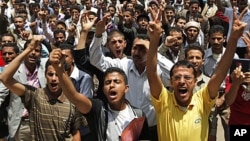Yemeni security forces shot dead at least 26 people and wounded hundreds more Sunday when they opened fire on tens of thousands of anti-government protesters in the capital, Sana'a - the worst violence in several months.
Government troops fired heavy-caliber machine guns, water cannons and tear gas on the demonstrators when they left Change Square and marched toward the nearby presidential palace. Thousands of protesters have camped out in the square for months.
Medics estimated that about 340 demonstrators suffered gunshot wounds, leaving at least 25 of them in critical condition. The interior ministry accused protesters of throwing gasoline bombs and wielding batons, wounding four government troops.
The rally was the first in months in which protesters ventured outside the area of Sana'a controlled by Major General Ali Moshen al-Ahmar, Yemen's top military officer, who has sided with the opposition. Protesters said they wanted to "escalate" the anti-government rebellion by moving to other districts of the capital.
The country's youth-led protest movement has stepped up demonstrations in the past week, angered after President Ali Abdullah Saleh instructed his deputy to negotiate a power-sharing deal. Many call the move just the latest in a number of Mr. Saleh's delaying tactics.
Yemen's National Council, a protest group, accused Mr. Saleh's troops of committing a "massacre." The council called on the United Nations to "end its silence" and intervene to protect the Yemeni people.
Demonstrations also took place Sunday in other Yemeni cities, including Taiz, Saada, Ibb and Damar.
The recent clashes in Sana'a began late Friday when witnesses said security forces fired at anti-government protesters camped out in a square.
The demonstrators are demanding that Mr. Saleh step down.
He remains in Saudi Arabia, where he has been recovering from injuries sustained in a June attack on his presidential compound. Earlier this month, he authorized Vice President Abed Rabbo Mansour Hadi to negotiate an end to the crisis.
In April, the six-nation Gulf Cooperation Council proposed a plan designed to end Yemen's anti-government turmoil. Mr. Saleh agreed to the proposal three times, but backed out each time before the deal could be signed.
Some information for this report was provided by AP, AFP and Reuters.














